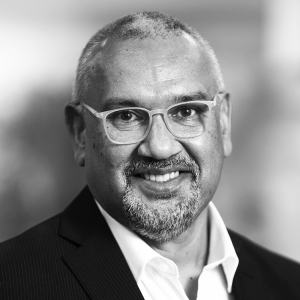
Mark Yettica-Paulson is the Indigenous Lead for the SILA Program. He is also the Deep Collaboration Lead for Collaboration for Impact and CEO of Super Native Unlimited.
Mark Yettica-Paulson is an experienced intercultural leadership and collaboration specialist, and an Australian Indigenous leader from the Birrah, Gamilaroi and Bundjalung peoples, from South East Queensland and North East NSW regions.
As the Indigenous Lead for the SILA Program he provides a rich perspective of First Nations leadership development and collaboration from his 20+ years of experience working in the field, facilitating the exchange of intercultural leadership knowledge and providing expert advice for engaging with Aboriginal communities across Australia in locations where the SILA Program is held.
A First Nations leadership lens
“First Nations leadership development applies a cultural lens to governance and empowerment within Indigenous communities,” Mark explains.
“It harnesses a “dual-pronged approach”, to support Indigenous leaders to fulfil their own leadership desires within their community, and to develop skills to lead other people, from non-Indigenous, and multicultural backgrounds in Australia.”
The First Nations lens also looks at how leaders from diverse social and cultural backgrounds can develop the necessary strengths, awareness and practices “to lead together” with Indigeous people, to achieve better outcomes for all.
“The concept of cultural governance is central to the First Nations leadership model, which considers and establishes culturally appropriate ways of working with Indigenous communities. For organisations to blossom, they must determine who holds authority, and where decision making rests, within different contexts.
“We need to think about the kind of governance structures we need, and who the top layer of authority should be. This is important to ensure that organisations fit the cultural makeup and cultural comfort zone of key stakeholders,” Mark says.
For First Nations communities, “our highest level of authority is invested in our senior people, our elders, who are the custodians of our traditions and customs. They are the ones who hold governance and are ultimately the ones who we would want to represent us as we move forward,” he adds.
Adaptive strategies for strong leadership
The SILA Program encourages leaders to dive deep, have hard conversations with themselves, their coaches, their teams, and others, to establish authentic connections and achieve enduring positive impact.
“We are facing some big issues in Australia and the world, and new ways of thinking and operating are required to shift the dial on key issues, such as equality and climate change,” says Mark.
SILA explores adaptive leadership models to investigate challenge and complexity and Mark believes we have to be “adaptive enough to let go of the things that we once thought of as the pillars of our society, and the ways of doing and being that no longer serve us.”
Doing so requires tough conversations and courageous action, grounded in authenticity.
“We’re going to need different ways of knowing, being and doing, in order for us to save the planet, be better leaders, and carve out an identity that really feels like ours,” says Mark.
“That takes bravery and commitment, and summoning the strength is just like the moment before you step out on stage. You’ve got to conjure up self-belief, and know that you’ve got this and that change is truly possible.”
